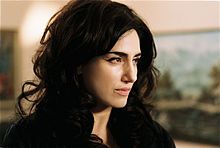Jaffa (film)
| Movie | |
|---|---|
| German title | Jaffa |
| Original title | Jaffa |
| Country of production | Germany , Israel , France |
| original language | Hebrew , Arabic |
| Publishing year | 2009 |
| length | 106 minutes |
| Rod | |
| Director | Keren Yedaya |
| script | Keren Yedaya, Illa Ben Porat |
| production |
Emmanuel Agneray , Jérôme Bleitrach , Benny Drechsel , Marek Rozenbaum , Karsten Stöter |
| music | Shushan |
| camera | Pierre Aïm |
| cut | Asaf Korman |
| occupation | |
| |
Jaffa (the city of the same name is nicknamed "Bride of the Sea") is a film by the Israeli director Keren Yedaya and tells of a "forbidden" love between a Jew and an Arab. The 2009 production with Franco-German participation ran outside of the competition in Cannes in the same year .
action
The 21-year-old Mali is the daughter of the Jewish garage owner Reuven Wolf, who in addition to her and his son Meir also employs two Arabs: Hassan and his son Toufik. The most common cause of tension in the workshop and in the Wolf family is Meir's behavior. As the designated heir of the small family business, he claims privileges and at the same time achieves next to nothing, but is also labeled a failure , especially by his mother, a spoiled, capricious housewife. Another conflict material is hidden from the family: Mali and Toufik are a couple. Friends since childhood, they meet secretly at night; Mali is also pregnant and they are planning a secret wedding in Cyprus. On the morning of the conscious day, however, Meir (after being kicked out and a night of drinking) starts an argument with Toufik, falls unhappy and dies in the hospital. Toufik is sentenced to several years in prison for manslaughter. Mali decides to have an abortion, but lets the appointment pass. She tells her parents that the child is from a married man and encourages them to move away together. She renounces Toufik; in a letter she informed him that she had had an abortion.
Toufik was released early nine years later. He returns to his family's lap, but immediately contacts Mali and asks them to meet him only once more. She doesn't manage to do this until the second attempt, but immediately confronts him with the full truth. He can't take that and drives away. Now Mali decides to reveal to her parents who the father of their daughter Shiran is. She secretly takes off with her and leaves her parents a letter. Already tracked down by them the next day, there is a confrontation and a break; the mother's last sentence is: You destroyed this family.
The final picture shows Mali and Shiran on the beach; they await Toufik, who carefully approaches both of them.
background
“I wanted to make a political film about Israel and Palestine. But I wanted to appeal to a larger audience than 'political cinema' normally can. I was genuinely convinced that you could create a subversive work of art without having to forego a broad audience. ”Keren Yedaya
criticism
"A tightly staged and acted film that focuses the conflict in the Middle East on a family business."
“Only the last few minutes of the film are problematic, in which the script tries to answer unanswered questions with a little too much pressure to explain. Regardless of this, Keren Yedaya has succeeded in making another film that tells sensitive and realistic about life on the lower edge of society and at the same time, without a soft focus, creates the timid utopia of love across enemy lines. "
“ Jaffa is a very intelligently made political, but also a social statement that both saddened and hoped. An important contribution to talk about. Ultimately, this is exactly what is not done in the film. And the inability to communicate is what Yedaya denounces the most. "
Web links
- Jaffa in the Internet Movie Database (English)
- Official page for the film

